人教版-英语-七上-6单元like bananas Period Two 教案
【自用】七年级英语 Unit6 Do you like bananas Period 2 说课稿

Unit6 Do you like bananas?Period 2说课稿我说课的内容是人教版英语七年级上册Unit 6 Do you like bananas? 第二课时,我将从以下几方面展开我的说课:一、说教材本单元以食物为话题贴近学生的生活实际,围绕着谈论喜欢与不喜欢的食物以及一日三餐等语言功能展开一系列任务活动,学生比较感兴趣。
本节课主要学习动词like一般现在时的肯定句和否定句及有关食物的可数名词与不可数名词。
二、说学情七年级的学生已具备了一定的英语学习基础,他们活泼好动、好奇心强、喜欢游戏、竞赛等,但对于谈论生日派对进行分角色表演有一定难度,需要教师从学生的活动入手,注重学习的趣味性。
三、说学习目标1.掌握重点单词food, fruit, vegetable等;2.学会使用动词like询问对方喜欢与不喜欢的食物,掌握动词like的一般现在时的肯定句和否定句的用法,3.通过学习培养学生表达自己的喜好,树立良好的饮食习惯和健康的饮食观。
学习重点:1.掌握重点单词及他们的分类规则;2.掌握动词like的一般现在时的肯定句和否定句的用法。
学习难点:引导学生进行分角色表演对话,达到学以致用的目的。
四、根据学情说教法、学法在三师“创设开放式教学情境,构建体验性教学模式”的理念下,采用我校的“情境互动”教学模式,充分发挥专业教室的功能,以趣味活动为主线,以体验感悟、交流提升为中心,采用情景教学法、任务型教学法等引导学生在轻松愉快的氛围中快乐的学习。
学习方法:小组合作法、交流展示法五、说教具学具:专业教室展板、多媒体课件、词汇卡片、录音机等。
六、说教学流程一、歌谣激趣---导入课题(约2分钟)师自我介绍,创设情境,引出birthday dinner,师生共同演唱歌谣,问:Do you like bananas?由此引入课题并板书。
设计意图:激发学生的学习兴趣,在师生互动中,消除师生之间的陌生感,让学生在快乐中启迪思维,感受学习语言的快乐。
人教版七年级英语上册Unit6Doyoulikebananas教案
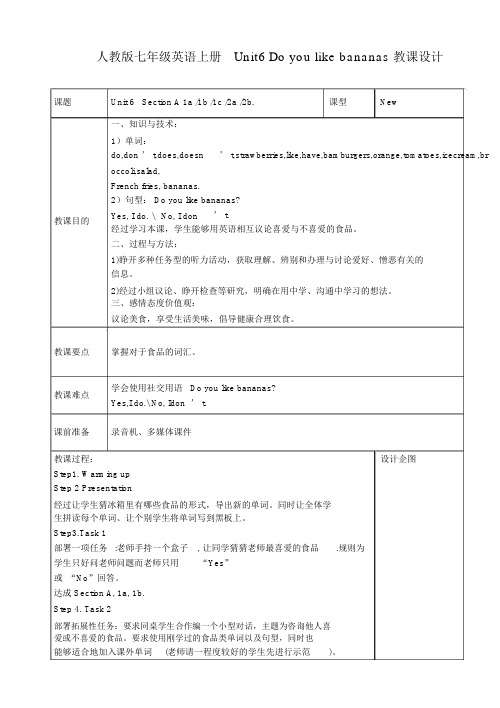
人教版七年级英语上册Unit6 Do you like bananas教课设计课题Unit 6 Section A 1a /1b /1c /2a /2b. 课型New一、知识与技术:1)单词:do,don ’ t,does,doesn ’ t,strawberries,like,have,bamburgers,orange,tomatoes,icecream,broccoli,salad,French fries, bananas.2)句型: Do you like bananas?教课目的Yes, I do. \ No, I don ’ t.经过学习本课,学生能够用英语相互议论喜爱与不喜爱的食品。
二、过程与方法:1)睁开多种任务型的听力活动,获取理解、辨别和办理与讨论爱好、憎恶有关的信息。
2)经过小组议论、睁开检查等研究,明确在用中学、沟通中学习的想法。
三、感情态度价值观:议论美食,享受生活美味,倡导健康合理饮食。
教课要点掌握对于食品的词汇。
教课难点学会使用社交用语 Do you like bananas? Yes,I do.\ No, Idon ’ t.课前准备录音机、多媒体课件教课过程:设计企图Step1. Warming upStep 2 Presentation经过让学生猜冰箱里有哪些食品的形式,导出新的单词。
同时让全体学生拼读每个单词、让个别学生将单词写到黑板上。
Step3.Task 1部署一项任务:老师手持一个盒子, 让同学猜猜老师最喜爱的食品.规则为学生只好问老师问题而老师只用“Yes”或“No”回答。
达成 Section A, 1a, 1b.Step 4. Task 2部署拓展性任务:要求同桌学生合作编一个小型对话,主题为咨询他人喜爱或不喜爱的食品。
要求使用刚学过的食品类单词以及句型,同时也能够适合地加入课外单词(老师请一程度较好的学生先进行示范)。
Step 5.达成课文32 页 Section A 听力练习activity 2a, 2b.Setp 6.当堂听写听写单词与句型,进一步稳固本课学习内容,并将本课应掌握的单词和句型落实到“写”上,使学生不只会说同时会写。
新人教版英语七年级上册unit6《do you like bananas period two》优秀教案(重点资料).doc
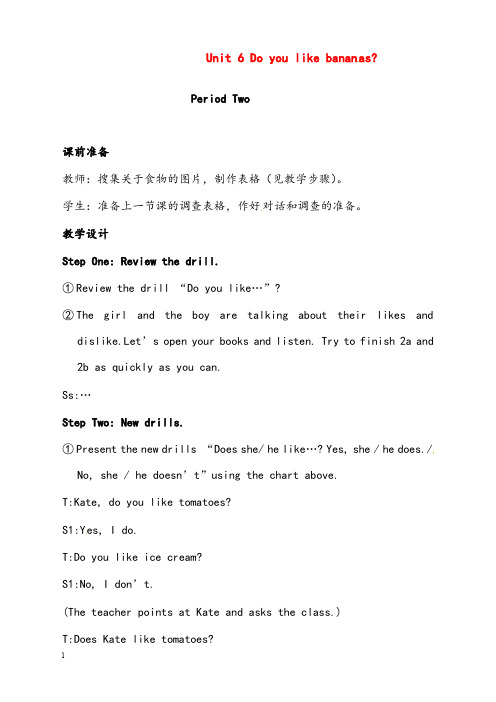
Unit 6 Do you like bananas?Period Two课前准备教师:搜集关于食物的图片,制作表格(见教学步骤)。
学生:准备上一节课的调查表格,作好对话和调查的准备。
教学设计Step One: Review the drill.①Review the drill “Do you like…”?②The girl and the boy are talking about their likes anddislike.Let’s open your books and listen. Try to finish 2a and 2b as quickly as you can.Ss:…Step Two: New drills.①Present the new drills “Does she/ he like…? Yes, she / he does./No, she / he doesn’t”using the chart above.T:Kate, do you like tomatoes?S1:Yes, I do.T:Do you like ice cream?S1:No, I don’t.(The teacher points at Kate and asks the class.)T:Does Kate like tomatoes?Ss:Yes, she does.T:Does Kate like ice cream?Ss:No,she doesn’t.(The teacher goes on asking Kate using the chart.)T:Does your best friend Sue like tomatoes?S1:Yes, she does.(Kate looks at her chart in her hand.)T:Who is your best friend?(The teacher points at Jane.)S1:Sally is.T:Does she like tomatoes?S1:Sally is.(The teacher points at Tony and Maria.)T:Do your best friends like tomatoes?S1:Yes, they do./No, they don’t.(The teacher asks two more students to answer his/ her questions according to the chart in their hands. Then the teacher writes down the drills “Does she/he like…?Do they like…?”on the blackboard.)T:Work in pairs and practice the drill “Does he/she…? Do they…?”according to the chart.(Then the teacher asks some pairs of the students to practice one by one.)②Practice the drills.T:Let’s work in pairs .(Student A looks at Page 33.Student B looks at Page 83.Try to find out what Bob and Bill and don’t like.)Sa:Does Bill like French fries?Sb: … Does Bob like French fries?Sa: …Step Three: Task.T:Do you love your parents?S:Yes.T:How do you show your love to them?S1:I’ll do as they say.S2:I’ll buy something for them when their birthd ay is coming. S3:I’ll study better and betterS4:I’ll make a big meal for them.T:Oh, I think it’s a good idea. Now let’s try to know what they like and dislike. First take out yesterday’s homework,exchange the information in pairs.(The teacher have asked the s tudents to have a survey last class.)(Give a sample to the students)T:Does your father like chicken?(Point to a student)S1: No, he doesn’t.T:Does your mother like eggs?S1:Yes, she doesT:Do they like bananas?S1: Yes, they do.T:Now work in groups and make a food survey.dislike(The students work in groups.)S2:Jim’s father likes… He doesn’t like… Jim’s mother likes…very much. She doesn’t like…And they both don’t like…(Then ask more students to report.)Step Four:Summary.In this class, we’ve learnt the Simple Present Tense,including of the third person singular form as subject.Homework.Rewrite your conversation in the form of a passage.。
人教版-英语-七上-6单元like bananas (教案)
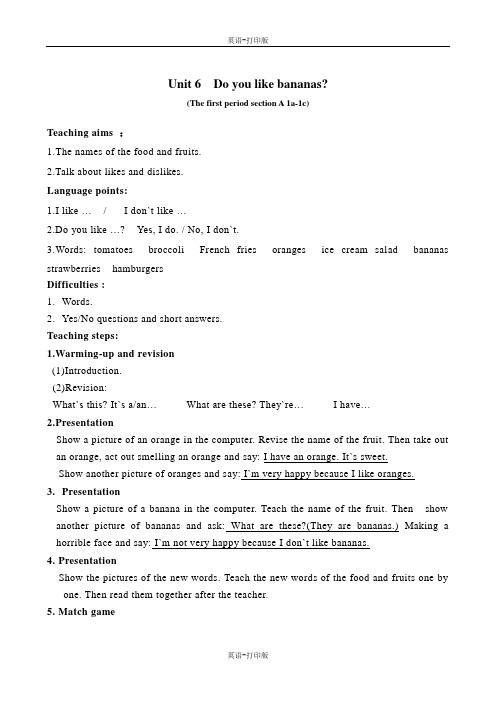
Unit 6 Do you like bananas?(The first period section A 1a-1c)Teaching aims :1.The names of the food and fruits.2.Talk about likes and dislikes.Language points:1.I like … / I don`t like …2.Do you like …? Yes, I do. / No, I don`t.3.Words: tomatoes broccoli French fries oranges ice cream salad bananas strawberries hamburgersDifficulties :1.Words.2.Yes/No questions and short answers.Teaching steps:1.Warming-up and revision(1)Introduction.(2)Revision:What`s this? It`s a/an… What are these? They`re… I have…2.PresentationShow a picture of an orange in the computer. Revise the name of the fruit. Then take out an orange, act out smelling an orange and say: I have an orange. It`s sweet.Show another picture of oranges and say: I`m very happy because I like oranges.3.PresentationShow a picture of a banana in the computer. Teach the name of the fruit. Then show another picture of bananas and ask: What are these?(They are bananas.) Making a horrible face and say: I`m not very happy because I don`t like bananas.4. PresentationShow the pictures of the new words. Teach the new words of the food and fruits one by one. Then read them together after the teacher.5. Match gameGive the picture cards to some students, and the words` cards to other students. Then let them listen and match. After it, they can finish Section A 1a.6. Chant7. Guessing gameGuess what the teacher`s favourite food is. The teacher say: I like … Let students guess by using: Do you like …? Then the teacher answer: Yes, I do. / No , I don`t.8. Listening1b. Listen and number the conversations.9. Discussion1c.Ask the students to talk about their likes and dislikes in talking pairs.10. HomeworkOral work:Recite the new wordsWritten work:1. Copy the new words2. Making up dialogues between you and your parents aboutlikes and dislikesBlackbaord planning:Unit 6 Do you like bananas?Yes , I do. I like ……No ,I don`t. I don`t like……。
人教版-英语-七上-6单元 like bananas (SectionA-2d–3c)教案
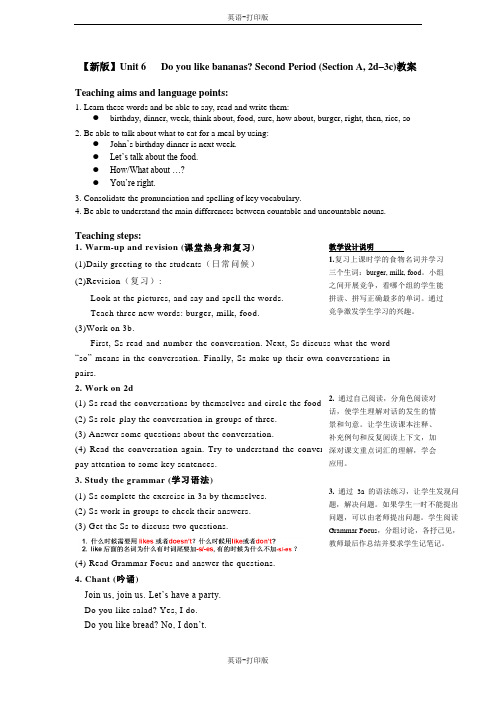
【新版】Unit 6 Do you like bananas? Second Period (Section A, 2d –3c)教案Teaching aims and language points:1. Learn these words and be able to say, read and write them:● birthday, dinner, week, think about, food, sure, how about, burger, right, then, rice, so 2. Be able to talk about what to eat for a meal by using:● John ’s birthday dinner is next week. ● Let’s talk about the food. ● How/What about …? ● You’re right.3. Consolidate the pronunciation and spelling of key vocabulary.4. Be able to understand the main differences between countable and uncountable nouns.Teaching steps:1. Warm-up and revision (课堂热身和复习) (1)Daily greeting to the students (日常问候) (2)Revision (复习):Look at the pictures, and say and spell the words. Teach three new words: burger, milk, food. (3)Work on 3b.First, Ss read and number the conversation. Next, Ss discuss what the word “so ” means in the conversation. Finally, Ss make up their own conversations in pairs.2. Work on 2d(1) Ss read the conversations by themselves and circle the food in it. (2) Ss role-play the conversation in groups of three. (3) Answer some questions about the conversation. (4) Read the conversation again. Try to understand the conversation better and pay attention to some key sentences. 3. Study the grammar (学习语法)(1) Ss complete the exercise in 3a by themselves. (2) Ss work in groups to check their answers. (3) Get the Ss to discuss two questions.(4) Read Grammar Focus and answer the questions. 4. Chant (吟诵)Join us, join us. Let’s have a party. Do you like salad? Yes, I do. Do you like bread? No, I don’t.2. 通过自己阅读,分角色阅读对话,使学生理解对话的发生的情景和句意。
【山东】《Unit 6 Do you like bananas Period 2》教案 (新版)人教新目标版
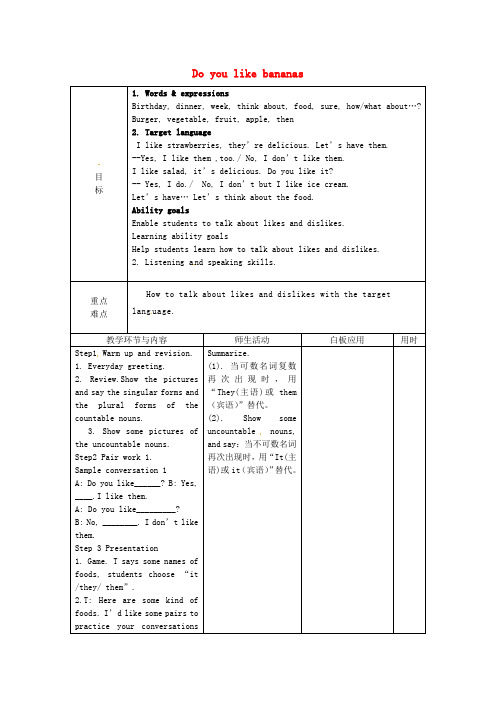
--Yes, I like them ,too./ No, I don’t like them.
I like salad, it’s delicious. Do you like it?
-- Yes, I do./ No, I don’t but I like ice cream.
2.T: Here are some kind of foods. I’d like some pairs to practice your conversations in front of the class, any volunteers?
Examples:
(1)Does Bob like strawberries?
S2: Yes, I do. / No, I don’t.
Sample dialogue 2:
S1:Let’s have salad. S2: Oh, no.
S1: No? S2: I don’t like it. I like ice cream.
Then ask some pairs of students to act out their conversations for the class.
Yes, he does. He likes them.
/ No, he doesn’t. He doesn’t like them.
(2)Does Cindy like tomatoes ?
Yes, she does. She likes them.
/ No, she doesn’t. She doesn’t like them.
英语七年级上册Unit6Doyoulikebananas人教版七年级上unit6课件
I couldn’t think of the name of that man. 我想不出那人的名字来了。
Let’s think of some questions about life. 让我们对生活设想一些问题吧。
4. sure adv. (副词)当然;肯定;一定 常用来回答一般疑问句,意为“当然; 的确”,相当于yes或certainly。只是 sure 在英国英语中较为常用,而在美国 英语中常用certainly。
Jack: Hey, John’s birthday dinner is next week.
Let’s think about the food.
Tom: Sure. How about burgers, vegetable salad,
and some fruit?
2d
Bill: Sounds good. John likes hamburgers.
last week 上礼拜
this week 本周
next week 下周
3. think about 思考,思索
(一般是短时间的较仔细的考虑) What do you think about that? 你认为怎么样? I’ll have to think about it. 我得想一想。
think of 想到;想象;设想 多用来指“想起,认为”。
Countable nouns Uncount- Countable and
able uncountable
nouns nouns
hamburgers, e_g_g_s milk _o_r_a_n_g_e_s__a_p__p_le_s_ bread _b_a_n_a_n__a_s__p_e_a_r_s_ rice _ca_r_r_o_t_s__t_o_m_a__to_e_s _v_e_g_e_t_a_b_le_s______
人教版-英语-七上-6单元like bananas(The Second Period)
Unit 6 Do you like bananas?The Second Period SectionTeaching aims教学目标1 学会谈论第三人称(he/she)的喜好2 巩固有关食物的单词Language points1要求掌握以下句子(1)—Does she/he like apples?—Yes,she/he does,she/he likes apples.—No,she/he doesn`t,she/he doesn`t like apples.(2)—Do they like apples?—Yes,they do,they like apples.—No ,they don`t .Thet don`t like apples.2 Difficulties(1)Does……do sth?的动词要用原形(2)He/She likes apples.中的动词后一定要加“s”Teaching stepsStep 1 Warming-up and revision(1)Play a guessing game 教学设计说明T:show pictures of food,drinks,fruits fast. 1复习食物单词以达Ss:guess one by one and spell it. 巩固之目的T:check it and show the correct spelling on the right. 2通过这一步训练学(2)Listen(to 2b)and fill in the form 生的听力能力,使(Ask S2 to read the dialogue to check the answer) 死的词汇变活的语言Step 2 Presentation(呈现)(From the listening material we know the boy`s and the girl`slikes and dislikes.Now I want to know what you like and dislike)(1)T:(To a boy student)Do you like tomatoes?3通过公开展示he/sheS1:Yes,I do. 的喜好,使学生更清T:(To Ss)Does he like tomatoes?楚其用法以例巩固Ss:Yes,he does.He likes tomatoes.(Ss look at the screen and read them again)T:(To St2)Do you like salad?St2:No,I don`t.T:(To Ss)Does he like salad?St2:(helped by the teacher)No,he doesn`t.He doesn`t like salad.(Ss look at the screen and read them again)(2) T :(To a girl student )Do you like icecream ?S1:Yes ,I do.T :(To the Ss )Does she like icecream ?Ss :Yes ,she does.She likes icecream.(Ss look at the screenand read them again)T :(To S2)Do you like tea ?S2:No ,I don`t.T :(To Ss )Does she like tea ?Ss :No ,she doesn`t.She does like tea..Step3 Practice(1)Ss do the same as the teacher. 4通过多种(2)Ss practise them in groups. 形式的练(3) Ask Ss to act it out. 习以使学(4) Ask Ss to write out his partner`s 2 likes and 2 dislikes. 生提高并(5) Let Ss have a competition between the girls and boys using the key phrases. 保持学习 (T give a example) 的兴趣, Does she/he like……? 时句型的 S1:(look at the student`s sentence ) 巩固落到Yes ,he does.He likes…… 实处。
人教版-英语-七上-6单元like bananas(全单元教案1)
教案 Unit 6 Do you like bananas 单元整体说明单元教材分析本单元主要学习动词like 的肯定句、否定句的用法;动词like 的一般疑问句的用法以及肯定与否定的回答。
本单元以介绍食物,谈论喜欢与厌恶为主题,设计了三个任务:先是搜集、利用图片来介绍有关的食物,学习一些食物名词;然后是学习询问对方喜欢与不喜欢的食物,掌握动词like 的一般疑问句的构成以及它的肯定、否定的回答;最后是用所学过的食物名词制定一次野炊活动的采购单。
本单元的重点内容仍然是行为动词在一般现在时句子中的使用,应该是上一个单元内容的延伸,通过本单元的教学,学生应初步掌握行为动词一般现在时的肯定句、否定句、一般疑问句的构成以及简单的回答。
单元知识系统(树)Do you /they like salad? Yes ,I /they do ./No ,I /they don’t .Does he /she like salad? Yes ,he /she does ./No ,he /she doesn’t.I/They like oranges . I /They don’t like oranges .He /She likes ice cream . He /She doesn’t like bananas .单元总体目标学会使用动词like 询问对方喜欢与不喜欢的食物;学会谈论自己与他人早、中、晚餐喜欢吃的食物;学会营养配餐并能够制作购物单和调查表。
单元重难点一览重点难点 1.复习词汇:like 2.词汇:banana ,hamburger ,tomato ,broccoli ,French fries , orange ,ice cream ,salad ,strawberry ,breakfast ,lunch , dinner ,egg ,apple ,chicken ,fruit ,vegetable3.句型:Do you/they like salad? Yes ,I/they do ./No ,I /they don’t .Does he/she like salad? Yes ,he/she does ./No ,he/shedoesn’t.语法重点:动词like 一般现在时的肯定句、否定句和一般疑问句的用法以及肯定与否定的回答。
人教版-英语-七上-6单元like bananas Period 2 教案
【新版】Unit 6 Do you like bananas? Period 2 Listening and speaking教案Target language1. Words & expressionsBirthday, dinner, week, think about, food, sure, how about…? Burger, vegetable, fruit, apple, then2. Key sentences重点句子Do you / they like…?Does he / she like…?.I / They like / don’t like…She / He likes / doesn’t like…Let’s have…Ability goalsEnable students to talk about likes and dislikes.Learning ability goalsHelp students learn how to talk about likes and dislikes.Learning important / difficult pointsHow to talk about likes and dislikes.Teaching procedures and ways教学过程与方式Step I Revision and and Lead-inCheck the students’ homework and ask them to spell some new words and make a dialogue about their likes and dislikes.T: Li Pin g. What’s your favourite food?S: Hamburgers.T: Well, can you spell the word for us?S: H-a-m-b-u-r-g-e-r-s.T: Good. Do you like French fries?S: No, I don’t. But I like ice cream very much.Write “hamburger”, “French fries” and “ice cream” on the bla ckboard.T: Thank you. Next, I’d like some pairs to practice your conversations in front of the class, any volunteers? I’ll give the best pair a prize as a reward.Sample conversation 1:S1: Do you like strawberries?S2: Yes, I do.Sample conversation 2:S1: Do you like bananas?S2: No, I don’t but I like tomatoesStep II Listening (2a, 2b)Ask the students to read the words in the box and talk about the pictures first, then listen to the recording and finish activities 2a and 2b.T: We can see many English names for food in the box of activity 2a. Do you know them? Can you understand the meaning of each of them?Invite one student to practice reading and tell the meanings of the words. And then ask students to read after the teacher and finally ask them to practice reading by themselves.T: Next we’ll listen to three conversations. In the conversation, a boy and a girl are talking about their likes and dislikes about food. For the first time, please don’t look at your book. Just listen carefully.Play the tape for the first time. Ask the students to listen to the recording again and try to finish the sentences in the picture.T: We can see some pictures and some sentences in 2b. In the first picture we can see some hamburgers. Do you know the food in picture 2 and 3?Get the students to talk about the last two pictures and choose the names for the food from 2a. Then ask them to listen to the tape again and try to finish the sentences in the pictures.Play the recording again, check the answers. And then ask students to listen again and repeat after the recording.Step III Pair work (2c)Ask students to work in pairs to practice the above conversations and give answers that are true to themselves.T: I know every one of you have some food you lik e and don’t like. Now I’d like you to write down the names of food you like and don’t like.Sample list:Like don’t likefish beanscarrots riceapples bananas…. ….Sample dialogue 1:S1 I like tomatoes. Do you like tomatoes?S2: Yes, I do. / No, I don’t.Sample dialogue 2:S1:Let’s have salad.S2: Oh, no.S1: No?S2: I don’t like salad. I like ice cream.…Then ask some pairs of students to act out their conversations for the class.Step IV Role-playAsk the students to read this part by themselves first, and then , put them into groups of 3, act out the dialogue.Step V Homework1.Ask the students to recite 2d.2.Ask the students to practice talking about the food they like and dislike usingdifferent persons and nouns.。
- 1、下载文档前请自行甄别文档内容的完整性,平台不提供额外的编辑、内容补充、找答案等附加服务。
- 2、"仅部分预览"的文档,不可在线预览部分如存在完整性等问题,可反馈申请退款(可完整预览的文档不适用该条件!)。
- 3、如文档侵犯您的权益,请联系客服反馈,我们会尽快为您处理(人工客服工作时间:9:00-18:30)。
Unit 6 Do you like bananas?
Period Two
课前准备
教师:搜集关于食物的图片,制作表格(见教学步骤)。
学生:准备上一节课的调查表格,作好对话和调查的准备。
教学设计
Step One: Review the drill.
①Review the drill “Do you like…”?
②The girl and the boy are talking about their likes and dislike.Let’s open your books and listen.
Try to finish 2a and 2b as quickly as you can.
Ss:…
Step Two: New drills.
①Present the new drills “Does she/ he like…? Yes, she / he does./ No, she /
he doesn’t”using the chart above.
T:Kate, do you like tomatoes?
S1:Yes, I do.
T:Do you like ice cream?
S1:No, I don’t.
(The teacher points at Kate and asks the class.)
T:Does Kate like tomatoes?
Ss:Yes, she does.
T:Does Kate like ice cream?
Ss:No,she doesn’t.
(The teacher goes on asking Kate using the chart.)
T:Does your best friend Sue like tomatoes?
S1:Yes, she does.(Kate looks at her chart in her hand.)
T:Who is your best friend?
(The teacher points at Jane.)
S1:Sall y is.
T:Does she like tomatoes?
S1:Sally is.
(The teacher points at Tony and Maria.)
T:Do your best friends like tomatoes?
S1:Yes, they do./No, they don’t.
(The teacher asks two more students to answer his/ her questions according to the chart in their hands. Then the teacher writes down the drills “Does she/he like…?Do they like…?” on the blackboard.)
T:Work in pairs and practice the drill “Does he/she…? Do they…?”according to the chart.
(Then the teacher asks some pairs of the students to practice one by one.)
②Prac tice the d rills.
T:Let’s work in pairs .
(Student A looks at Page 33.Student B looks at Page 83.Try to find out what Bob and Bill and don’t like.)
Sa:Does Bill like French fries?
Sb: … Does Bob like French fries?
Sa: …
Step Three: Task.
T:Do you love your parents?
S:Yes.
T:Ho w do you show your love t o them?
S1:I’ll do as they say.
S2:I’ll buy something for them when their birthday is coming.
S3:I’ll study better and better.
S4:I’ll make a big meal for them.
T:Oh, I think it’s a good idea. Now let’s try to know what they like and dislike. First take out yesterday’s homework,exchange the information in pairs.
(The teacher have asked the students to have a survey last class.)
Parents like dislike
Mother
Father
T:Does your father like chicken?(Point to a student)
S1: No, he doesn’t.
T:Does your mother like eggs?
S1:Yes, she does.
T:Do they like bananas?
S1: Yes, they do.
T:Now work in groups and make a food survey.
Parents like disl ike
Jim’s father
Jim’s mother
Kate’s father
Kate’s mother
S2:Jim’s father likes… He doesn’t like… Jim’s mother likes…very much. She doesn’t like…And they both don’t like…
(Then ask more students to report.)
Step Four:Summary.
In this class, we’ve learnt the Simple Present Tense,including of the third person singular form as subject.
Homework.
Rewrite your conversation in the form of a passage.。
